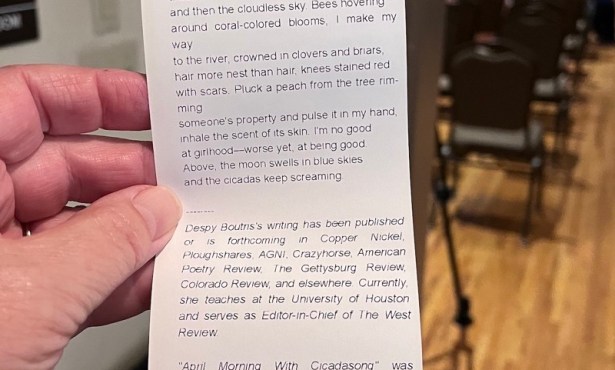Morning’s at Seven
Happy Destiny Productions Presents a Play by Paul Osborn on Friday, September 30.
In 1939, the intertwined lives of a handful of small-town people, most of them in their sixties, gave playwright Paul Osborn all the scope he needed to explore the vagaries of human emotion, loyalty, and desire with a deft comic touch. He called his play Morning’s at Seven. In this new production at Center Stage, director Maggie Mixsell and a fine cast have found the warmth, humor, and, most of all, the dramatic truth in Osborn’s work, which, though it stands partly in the shadow cast by Eugene O’Neill, exhibits a lively and at times even daring honesty. Theodore Swanson (Tim Whitcomb) has been living in the same small Indiana cottage with his wife, Cora (Hanne Pedersen), and his sister-in-law Aaronetta Gibbs (Ann Dusenberry) for 40 years. The show opens on what we are led to believe is a common occurrence: a minor squabble between the comically cantankerous Aaronetta and her long-suffering sister. “Arry” comes across as harsh and perhaps even delusional, while Cora provides the audience with a more reasonable-seeming point of view with which to identify. As Theodore, Whitcomb gets many of the early laughs with a wonderful, sardonic delivery that matches the setting and the tone of the piece perfectly.
Living right next door in an identical cottage are the Boltons, Ida (Kathy Marden), Carl (David Brainard), and their son Homer (George Coe), who has brought his girlfriend, Myrtle Brown (Jesi Vasquez), home to meet the folks. Of course, the Bolton household has its own issues, in particular the “spells” of regret and Weltschmerz to which Papa Carl is prone, and which appear to be hereditary. Last but not least, there are the Cramptons, David (Wilson Smith), the crotchety intellectual husband of the oldest of the Gibbs sisters, Esther. Pat Lentz gives a fine performance in this role, offering a range of expression that runs the gamut from peals of hysterical laughter to deadpan humor and heartfelt concern.
A series of more or less ill-advised ideas about who should occupy which part of the two houses seen onstage — and two others, much discussed, existing elsewhere in this small town — provides the impetus that moves the plot along. The whole thing progresses inexorably toward the revelation that things are not as they appear in any of these seemingly stable situations, and that older people, whether they like it or not, are as prone to marital upset as anyone. Everything about this elegantly staged and lit production is oriented toward giving its performers plenty of room to give and receive the tumultuous acknowledgments and recognitions that pour forth in the second and third acts. It would be poor form to spoil the ending, but suffice it to say there were layers of desire and betrayal in small-town Indiana circa 1939 every bit as compelling as anything that happened last week among the so-called “real housewives” of contemporary America. Dusenberry gets an entrance near the end of Act Three that’s as touching as it is hilarious, and Vasquez does a wonderful job of telling her character’s story without overplaying her emerging secrets. Congratulations are due to director Mixsell and everyone else involved in this satisfying revival of an overlooked American play.



